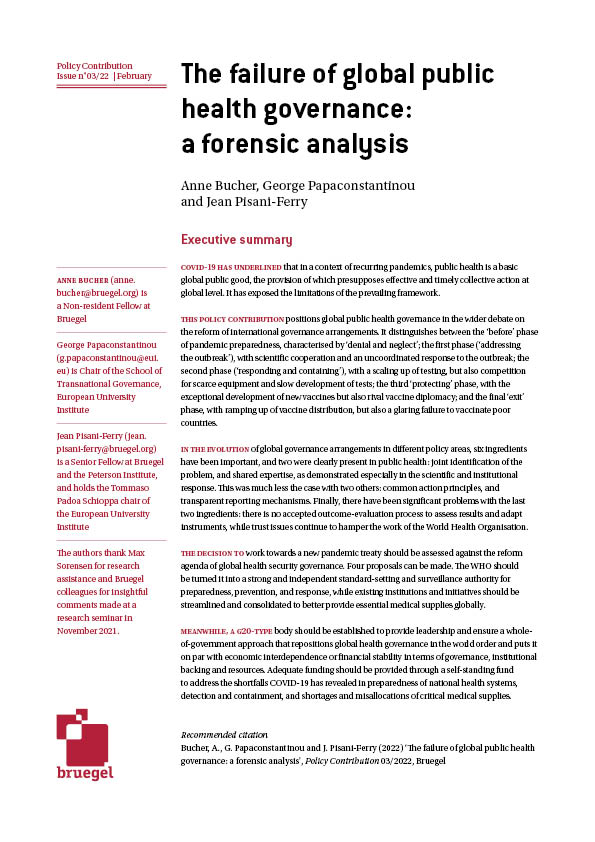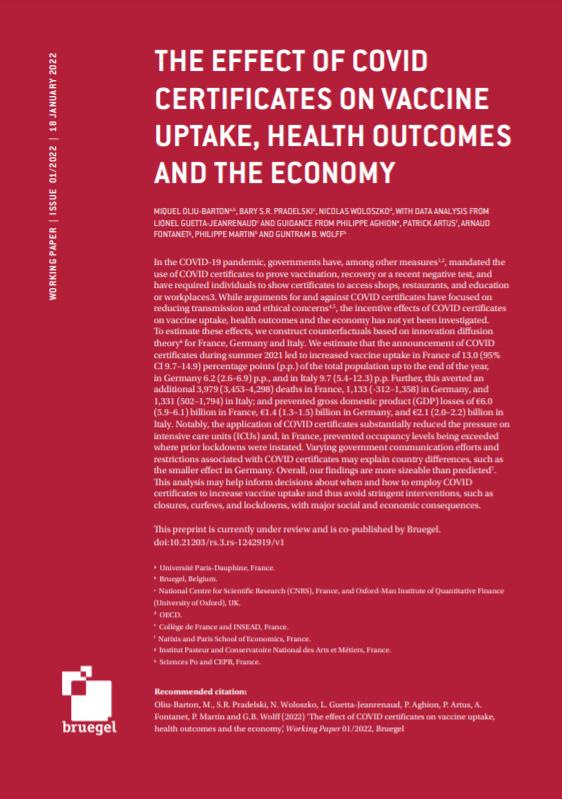Opinion
Aiming for zero COVID-19: Europe needs to take action
Aiming for 'green zones' offers a clear path to navigate an exit from the pandemic with as little damage as possible. Europe should not miss the opportunity to build on its strength and unity.
This opinion piece with nearly 30 signatories was originally published in de Volkskrant, Le Monde, Süddeutsche, La Repubblica, El Pais and Rzeczpospolita on the initiative of Miquel Oliu Barton and Bary Pradelski.
by Yaneer Bar-Yam, Pauline Beato, François Bricaire, Melanie Brinkmann, Antoine Flahault, Giulia Giordano, Mélanie Heard, Karine Lacombe, Jose Luis Jiménez, Jeffrey V Lazarus, Gianluca Manzo, Jose M Martin-Moreno, Maximilian Mayer, Michael Meyer-Hermann, Miquel Oliu-Barton, Matjaz Perc, Cécile Philippe, Bary Pradelski, Toni Roldan, Barbara Serrano, Matthias F. Schneider, Devi Sridhar, Samantha Vanderslott, Pablo Vázquez, Marco Vergano
Vaccination is a critical element for our way out of the pandemic. But the hope to reach herd immunity in Europe by the end of the summer is fading, as the roll-out of vaccines proves to be a major challenge. In addition, the emergence of new variants from Brazil, the UK, and South Africa is a warning signal that we may be confronted with lower protection from vaccines. Furthermore, history demonstrates that vaccination cannot single-handedly control a virus: it needs concerted efforts and a combination of public health measures. A global exit from the COVID-19 pandemic in 2021 seems unlikely if not impossible. To avoid lockdown cycles as experienced over the past and present year, we need to curb the spread of the virus as soon as possible, and choose the path of sustainable recovery. The European strategy needs to markedly shift its focus from long-term and nationwide lockdowns due to high numbers of non-traceable community transmission and high death tolls, to having the virus under control.
We thus call on politicians and the public to jointly commit to a European elimination strategy that builds on three pillars: Vaccination, green zones, and test, trace and isolate strategies. Importantly, this needs to be accompanied by clear, coherent and transparent communication. We are part of a group of international scientists ranging from epidemiologists, virologists, and mathematicians, to political scientists, and economists who support the strategy, some of whom have recently signed a call in The Lancet. In addition, No COVID – an approach suggested by a group of German scientists – is actively developing tools to render elimination successful.
While controlling the virus across Europe seems to be a daunting task, it can be achieved by defining common public health measures and standards that aim at achieving and then protecting green zones. The smaller the zones and the less mobility between them, the faster the exit can be reached and worst-in-class measures avoided. However, as the zoning needs to be politically and socially acceptable, and locally enforceable, each country should make its own pragmatic choice. For example, Italy could opt for regions, Germany could opt for Landkreise or Länder, and a small country like Lithuania could opt to be considered as one zone. Even more granularly, single cities could be considered a zone if feasible.
A zone is labelled green once the origin of every transmission is known, such that test, trace and isolate strategies can prevent further uncontrolled spreading of the remaining few infections. Green zones can progressively return to normal life: schools, restaurants, tourism and other businesses can fully reopen, and travellers freely move within and between green zones. Once a green zone is established, the priority then shifts from contact-inhibiting measures to avoid the reintroduction of the virus via travel regulations and testing, and the preparedness to implement fast, decisive and targeted containment measures should infections flare up locally again. Incoming travellers from non-green zones would be required to present a negative test and quarantine upon arrival. Furthermore, an effective test-and-trace system is required for essential travel with a particular focus on transit locations, meeting points, and other places with high numbers of visitors.
Is becoming a green zone worth the effort? Yes. Economically and socially, almost any short-term cost is outweighed by the benefits of exiting from the paralysis of the pandemic. Public health and economic prosperity are not competing but complementary objectives. In addition, the perspective of a secure return to normal will counter growing fatigue in the population, and provide motivation and empowerment in local communities. Although it seems hard to attain with the currently high levels of infections across Europe, we recall that many regions were green zones during last summer thanks to strict, simultaneous lockdowns. Beyond Europe, the clear commitment to eliminating COVID-19 has shown to be successful, notably in China, South Korea, Taiwan, Vietnam, Australia, and New Zealand. The greater number of green zones that are established, the more medical and financial support can be concentrated towards red zones to help them become green as fast as possible. The long-term vision is a Europe like a sea of green zones with only few, short lived outbreaks in individual red island that can be controlled by local rather than nationwide measures.
Aiming for green zones offers a clear path to navigate an exit from the pandemic with as little damage as possible. Europe should not miss the opportunity to build on its strength and unity. A coordinated plan would be most effective to control the virus, while avoiding unilateral border closures. European decision-makers have increasingly shown their willingness to overcome the obstacles of bureaucracy and politics to rise to the challenge the virus is posing us. As scientists, we pledge to our leaders and fellow citizens: Commit to eliminating COVID-19 and lead us towards a lasting green zone where life can safely return to a normality.
Republishing and referencing
Bruegel considers itself a public good and takes no institutional standpoint.
Due to copyright agreements we ask that you kindly email request to republish opinions that have appeared in print to [email protected].

















